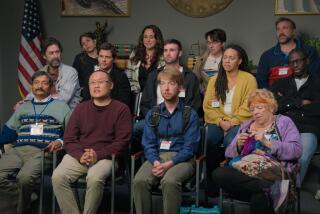Jury Selected in Shiley Heart Valve Defect Trial : Liability: A San Diego woman is seeking damages for emotional suffering caused by worrying that implanted device will fail.
- Share via
SANTA ANA — A jury of 10 women and four men was selected Monday to decide whether Shiley Inc. deliberately hid the defects in a controversial artificial heart valve it manufactured that has been linked to the deaths of 300 people.
Attorneys for Ruth Barillas, a San Diego resident who received a Bjork-Shiley heart valve more than 10 years ago, will try to persuade the Orange County Superior Court jury that Barillas was the victim of fraud by Shiley and its parent, Pfizer Corp. of New York.
Barillas seeks unspecified damages for emotional suffering because she, as well as tens of thousands of other heart valve recipients, are unsure if the valves they have implanted in their chests will fracture, causing death.
The attorneys maintain that the company knew the potentially defective Bjork-Shiley valve had a tendency to malfunction. They will further argue that Swedish doctor Viking O. Bjork, who implanted the first so-called convexo-concave valve in 1969, had warned the company in 1980 that he was discontinuing its use because he knew it was potentially fatal. The company discontinued selling that model in 1986.
Shiley attorneys, however, will argue that Bjork, in a recent sworn statement, had not condemned the valve when he switched to another, more technologically advanced model.
The valves, which are still implanted in about 50,000 people, malfunction when small metal struts that hold the valve in place crack under the stress of normal blood flow.
The company has disclosed that most of the valves that malfunctioned appear to have been made by a single employee, known only as employee 2832, and were part of a specific batch manufactured in 1981 and 1982.
If the jury rules that the company was not guilty of fraud, it will then decide if the company was negligent, attorneys said. In effect, there could be two separate phases of the trial, with the jurors deliberating twice.
Two alternate jurors will be selected.
Although there have been about 300 individual and class-action settlements in the case, the Barillas case is the first to go to a jury trial. A $215-million settlement last year involving 50,000 claimants is being appealed in a Pennsylvania court; another 300 heart valve recipients settled for $35 million late last year.
The Barillas trial is expected to be a bellwether for a series of future trials and settlements. Attorneys said that five other trials are set to be heard in Orange County Superior Court.
Bjork-Shiley Background
Monday’s jury selection marked the latest legal round against Shiley Inc. of Irvine, manufacturer of the potentially defective Bjork-Shiley heart valve. Where various cases now stand against the firm:
* Class-action lawsuit: In 1992, an agreement was reached in a class-action suit involving nearly 50,000 claims brought by recipients of the valve, which is known to have caused at least 300 deaths. An appeal of the $215-million settlement is pending before the 9th Circuit Court of Appeals in Pennsylvania.
* Further settlements: Approximately 1,000 additional recipients refused participation in the class-action suit, vowing to press individual settlements. Several months later, about 300 of them settled for $35 million (between $45,000 and $300,000 per recipient).
* The first trial: The trial beginning today is the first of as many as 100 other cases to be heard by a jury, with the majority consolidated in Orange County Superior Court. The suit, brought by a San Diego-area woman, seeks unspecified damages for the physical and psychological stress caused by a potentially defective valve.
* Canadian lawsuit: The provinces of Ontario and Manitoba have also filed suit here, seeking to cover medical costs associated with surgical replacement of the valve in approximately 2,000 province residents.
* Other California cases: An appeal is pending before the 4th District Court in Santa Ana over whether out-of-state heart valve recipients should be able to use California state courts to press their cases.
Source: Times reports; Researched by JANICE L. JONES / Los Angeles Times
More to Read
Inside the business of entertainment
The Wide Shot brings you news, analysis and insights on everything from streaming wars to production — and what it all means for the future.
You may occasionally receive promotional content from the Los Angeles Times.









